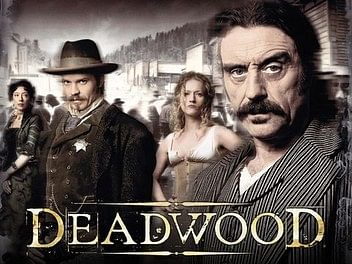
 Season Two, Episode Eight: "Childish Things" Note: each writing will spoil the episode in review but will not discuss any future episodes. Though the eighth episode opens with a serious discussion between Bullock and Swearengen about the possibility of throwing Yankton for a loop by warming up to Montana for annexation rather than Dakota, the overall throughlines of "Childish Things" are about those simplistic endeavors of life that bring a bit of calm to the storm, no matter how silly. That scene between Seth and Al does well to establish that Seth won't stand in the way of Al's tactics to try to make sure that the camp is annexed into a state or created officially in one form or another. In a more foreboding transition than the title implies, Wolcott's voiceover takes control as we hear his letter to George Hearst, who's arrival is "imminent." That's not good news for the camp, especially Alma Garret who is one of the few remaining gold claim owners there. Wolcott notes that he has laid hands on all considerable gold claims for Hearst except for Alma's. There is the minor exception of one claim belonging to the Manuel brothers. Later in the episode, its one of the same Manuel brothers whom Wolcott tries to coerce without aggravating -- with little luck -- and to whom he and Cy Tolliver wish to pay $200,000 for his claim. (For the record, that would be roughly over $4.5 million in today's dollars.) Hearst and his ilk are a clear metaphor for corporations of the modern era and time as that kind of money creates distrust and violence: Mose Manuel shoots his brother in cold blood over the claim. Mose, doubting himself as much as anyone else cares to doubt him, offers the explanation that the death was by accident, self afflicted. In another corporate analogy, Wolcott's voiceover also reveals the treatment of the hired miners. They are forced to shower after work to prevent stealing and used like machines rather than people. Wolcott wistfully and coldly wishes for workers who will not want time off, much like the Chinese operate. Later, these very Chinese -- in this case, the prostitutes linked to Hearst -- are dying in cages due to the savagery of ill care. Hearst does not care for the life, just the production. Martha visits Alma to present the idea of teaching the camp's children, which would include Sophia. The palpable distrust and anger between the women reaches a boil when they turn subtext into text and all but turn the heated conversation about the care of the camp children into one about Seth Bullock. It's with this confrontation that Martha later openly admits to Seth she realizes their affair happened. When Seth later confesses that it certainly occurred but never will again, Martha yells that she repudiates his offer. The sting in Timothy Olyphant's eyes is also palpable as he displays a man who's trying to make a new life work. He can't even talk the camp's sleazy conman into a fight. And speaking of cons, with Alice Isringhausen, Al finalizes the plans to accuse Alma Garret of her husband's demise and turn in the document over to the Pinkertons. It also allows Al his best line of the episode when he tells Ms. Isringhausen, "Anyhow, thanks for brushing against my prick" as she walks in. The rest of the episode, save for the rift between Bullock and his wife over his affair in her absence, does have a child-like wonder to it. It begins with the latest stagecoach bringing in both the telegraph operator, whom Merrick is enthralled with immediately, and Tom Nuttall's 19th Century bicycle (which he hilariously pronounces "BI-cy-kul"). It's the arrival of the later that creates one of the most saccarine, yet well earned, moments of the entire series: the entire camp gathers to see if Nuttall can ride the bike upright on a given path that includes both muck and wooden walkways. The entirety of the few seconds are breathtaking, as a joyous Tom rides through the camp. Perhaps even more mirth is gained from the expressions of everyone else. Seth Bullock smiles, Al cheers, "Go on, my Son!" Even Wolcott manages a grin. In the end, joy, comfort, and even hope comes from the childish things, as many characters experience. Even Joanie in the penultimate scene of the episode builds up enough hope to keep living rather than suffer the fate that Wolcott likely would doll out to her as she hits him over the head with the bourbon bottle. (Wolcott is especially temperamental as he grows weary of haranguing with Mose Manuel.) Jane's too late to save her, but even without joy, comfort, or hope, life continues as childish as it all seems. Other Takes:
Season Two, Episode Eight: "Childish Things" Note: each writing will spoil the episode in review but will not discuss any future episodes. Though the eighth episode opens with a serious discussion between Bullock and Swearengen about the possibility of throwing Yankton for a loop by warming up to Montana for annexation rather than Dakota, the overall throughlines of "Childish Things" are about those simplistic endeavors of life that bring a bit of calm to the storm, no matter how silly. That scene between Seth and Al does well to establish that Seth won't stand in the way of Al's tactics to try to make sure that the camp is annexed into a state or created officially in one form or another. In a more foreboding transition than the title implies, Wolcott's voiceover takes control as we hear his letter to George Hearst, who's arrival is "imminent." That's not good news for the camp, especially Alma Garret who is one of the few remaining gold claim owners there. Wolcott notes that he has laid hands on all considerable gold claims for Hearst except for Alma's. There is the minor exception of one claim belonging to the Manuel brothers. Later in the episode, its one of the same Manuel brothers whom Wolcott tries to coerce without aggravating -- with little luck -- and to whom he and Cy Tolliver wish to pay $200,000 for his claim. (For the record, that would be roughly over $4.5 million in today's dollars.) Hearst and his ilk are a clear metaphor for corporations of the modern era and time as that kind of money creates distrust and violence: Mose Manuel shoots his brother in cold blood over the claim. Mose, doubting himself as much as anyone else cares to doubt him, offers the explanation that the death was by accident, self afflicted. In another corporate analogy, Wolcott's voiceover also reveals the treatment of the hired miners. They are forced to shower after work to prevent stealing and used like machines rather than people. Wolcott wistfully and coldly wishes for workers who will not want time off, much like the Chinese operate. Later, these very Chinese -- in this case, the prostitutes linked to Hearst -- are dying in cages due to the savagery of ill care. Hearst does not care for the life, just the production. Martha visits Alma to present the idea of teaching the camp's children, which would include Sophia. The palpable distrust and anger between the women reaches a boil when they turn subtext into text and all but turn the heated conversation about the care of the camp children into one about Seth Bullock. It's with this confrontation that Martha later openly admits to Seth she realizes their affair happened. When Seth later confesses that it certainly occurred but never will again, Martha yells that she repudiates his offer. The sting in Timothy Olyphant's eyes is also palpable as he displays a man who's trying to make a new life work. He can't even talk the camp's sleazy conman into a fight. And speaking of cons, with Alice Isringhausen, Al finalizes the plans to accuse Alma Garret of her husband's demise and turn in the document over to the Pinkertons. It also allows Al his best line of the episode when he tells Ms. Isringhausen, "Anyhow, thanks for brushing against my prick" as she walks in. The rest of the episode, save for the rift between Bullock and his wife over his affair in her absence, does have a child-like wonder to it. It begins with the latest stagecoach bringing in both the telegraph operator, whom Merrick is enthralled with immediately, and Tom Nuttall's 19th Century bicycle (which he hilariously pronounces "BI-cy-kul"). It's the arrival of the later that creates one of the most saccarine, yet well earned, moments of the entire series: the entire camp gathers to see if Nuttall can ride the bike upright on a given path that includes both muck and wooden walkways. The entirety of the few seconds are breathtaking, as a joyous Tom rides through the camp. Perhaps even more mirth is gained from the expressions of everyone else. Seth Bullock smiles, Al cheers, "Go on, my Son!" Even Wolcott manages a grin. In the end, joy, comfort, and even hope comes from the childish things, as many characters experience. Even Joanie in the penultimate scene of the episode builds up enough hope to keep living rather than suffer the fate that Wolcott likely would doll out to her as she hits him over the head with the bourbon bottle. (Wolcott is especially temperamental as he grows weary of haranguing with Mose Manuel.) Jane's too late to save her, but even without joy, comfort, or hope, life continues as childish as it all seems. Other Takes:
- Al is as charming as he's ever been when introduced to the Blazanov, the camp's telegraph operator. It makes one think that he would even be cordial if met. Maybe that stroke and near-death experience truly changed him.
- Seth and Wolcott's childishness is juxtaposed here: Seth takes his anger out, once again, at his partner Sol Star after being confronted by his wife. Wolcott becomes murderous.
- Charlie, in worry over Jane's worsening condition, makes another stop to talk at Bill's grave. These scenes have such a note perfect melancholy tone, which is highly attributed to the subtle and infrequent score.
- In pure rage, Wolcott screams to an enslaved Asian prostitute since he can't yell in anger at Mose Manuel.
- In what feels like a perfect bit of 19th Century dialogue, Wolcott calls E.B. "a grotesque."
Quote of the episode: Jane, in response to Joanie who suggests that they not talk about the hard times they've endured: "If we held to that rule, we’d be mute like monks months at a fucking time."




